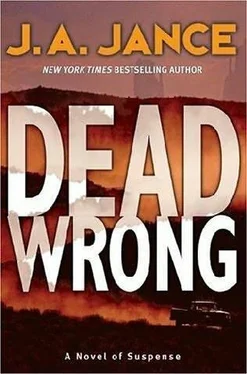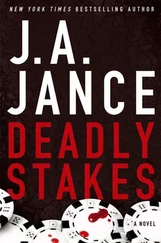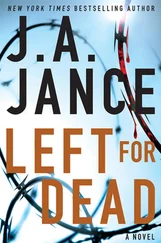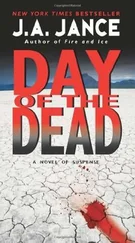“That would be Ernie Carpenter.”
“Right. Carpenter was his name. I told him everything I knew, but he wasn’t very happy with me.”
“Why not?”
“Because I made him go get a search warrant before I’d let him into Brad’s apartment. I wasn’t about to let him in without one. You know how those things work. Police treat ex-cons like dirt even though they’ve paid their debt to society.”
“Ernie did mention something about that,” Joanna said. “And you’re right to be cautious about letting anyone into a tenant’s apartment. But do you mind if I ask you to repeat what you told Ernie? I’m sure it’s all in his report, but things have been so hectic the last few days that I haven’t had a chance to read it.”
“I told the detective that Brad was a very nice man, but a very lonely one. All alone in the world.”
“When’s the last time you saw him?”
“I saw him leave home on Wednesday morning. I could see his carport from my kitchen window. I often saw him drive off in his pickup truck on his way to work when I was sitting at my kitchen table having my morning coffee. But the last time I talked to him would have been Tuesday night.”
“And why was that?”
“I took him some soup-navy-bean soup. The back wall of my kitchen is also the back wall of his apartment. So whenever I cooked something that smelled good-like soup or stew-I always took him some. It didn’t seem fair for him to come home from work and have to smell the food without being able to eat any of it.”
“So you took him soup?”
Marcelle nodded. “In one of those new Ziploc containers.”
“And was there anything out of the ordinary about your visit? How did he seem?”
“He was just the regular Brad, sitting there reading his Bible. If I hadn’t brought him the soup, he might not have remembered to eat. He was like that sometimes. He’d just get all caught up in his Bible study and forget about eating. He asked me if I wanted to sit with him and share some of his soup. I knew he would, you see, so I brought plenty for both of us. Wait until you get to be my age. You’ll see that it’s no fun eating alone.”
“You ate dinner with him?”
“Yes, and we talked about Revelations,” Marcelle said. “He liked one passage in particular. Revelations 21:4. I looked it up when I got back home. It didn’t make much of an impression on me then, but after I knew he was dead, I looked it up again. I even memorized it in Brad’s honor-at least I tried to. It goes something like this: God shall wipe away all their tears; there shall be no more death or sorrow or crying or pain because the former things are passed away.
“Do you think he knew he was going to die, Sheriff Brady? Do you think he had some kind of premonition?”
“Maybe,” Joanna said.
But right then it seemed far more likely to her that Brad Evans wasn’t seeing his own death in those words. He was, instead, seeing his supposedly murdered daughter inexplicably alive. Still, if he had made such an earth-shattering discovery, wouldn’t he have been shouting it from the rooftops rather than making oblique Bible-based comments about it to his landlady? Whom else would he have told? Or perhaps he himself wasn’t yet fully convinced and he hadn’t confided in anyone while he waited to make some kind of confirmation. That might be where the camera and the stealth photos came in.
“Did he seem sad or unhappy?” Joanna asked.
“Not at all,” Marcelle replied. “In fact, I’d say he was the exact opposite of sad. When he said grace before we ate, I remember him thanking God for the many blessings in his life-including me. I took that as a compliment.”
“I’m sure you were a blessing in his life,” Joanna said.
Marcelle nodded and dabbed at teary eyes with her already sodden hanky. “I hope I was,” she murmured and then frowned. “And he said something else-that he was grateful for second chances.”
“What kind of second chances?” Joanna asked.
“He didn’t say, not specifically, but I hoped it meant he had met a woman-a woman who was as nice as he was. It’s hard living alone, you know. I miss my Roger so much, and I had been praying for Brad to find someone who would make his life less lonely.”
“So you’re pretty sure the last time you saw him was Tuesday?” Joanna asked.
Marcelle nodded. “Wednesday was his day off. On Thursday I had an early-morning appointment with my dentist, so he might have been there and he might not, but not seeing him for a day or two at a time wasn’t all that unusual, either-not unusual enough for me to think about reporting him as missing. Brad often went out at night-to meetings and such. He was very involved in AA, you know. He must have been quite a drinker at one time, but I never saw any sign of liquor once he moved into my apartment. As I said, he was a very nice man, and I’m going to miss him.”
Ted Chapman appeared at Joanna’s elbow. “Sorry to interrupt,” he said, “but Mrs. Womack’s ride is here. So anytime you’re ready to go…”
“I’m ready to go right now,” Marcelle said, getting to her feet. “I’ve monopolized Sheriff Brady for far too long. Very nice meeting you,” she added. “I hope you find out who did this.”
“So do I,” Joanna replied.
As Marcelle tottered away with Ted Chapman at her side, Joanna turned to survey the rest of the room. Most of the inmates were gone by then. The two that remained were gathering up paper plates and plastic glasses and clearing off the refreshment table under the watchful eyes of two of the suit-clad jail ministry honchos.
Joanna walked up and introduced herself. One of the men was Rich Higgins, the human resources guy Ted Chapman had called. The other was Dave Enright, who identified himself as the executive director.
“Are you making any progress?” Dave asked, once he realized who Joanna was.
“Some,” she said. “But not much. We’re checking his phone and credit-card records to see if we can track what he was doing or who was in contact with him in the days before his death.”
“That would include his cell-phone records?” Rich Higgins asked.
“I’m not sure we knew he had a cell phone,” Joanna said. “I know we’re checking his home number. If my investigators had discovered a billing for a cell phone, I’m sure they would have included that in their request for phone company records.”
“There wouldn’t be a billing in his name,” Rich told her. “Our company cell phones are an in-kind contribution from one of the cell-phone-service providers. They provide the phones and the service both, so there is no individual billing as such.”
“Do you happen to have that number?” Joanna asked.
“Sure do.” Rich Higgins unsnapped a cell-phone case from his belt and scrolled through a list of numbers. “Here it is,” he said.
As Rich read off the number, Joanna jotted it down. Once she was out of the prison and back in her vehicle, she called Frank Montoya.
“How was the funeral?” he asked.
“About what I expected. Got to talk to Bradley’s landlady and to a couple of his jail ministry colleagues, which is why I’m calling. Have you had a chance to check Bradley Evans’s phone and credit-card records?”
“The phone was easy,” Frank said. “I don’t know why he even bothered to have one. From what I could see, he hardly used the damned thing.”
“I know why,” Joanna said. “He had a cell phone somebody else was paying for.” She gave Frank the number. “What about credit-card usage?”
“Nothing after he disappeared,” Frank answered. “The last time it was used was on Wednesday. He had lunch at Denny’s in Sierra Vista on Tuesday. From the size of the bill, I’d say he ate alone. On Wednesday he bought a camera from a Walgreen’s on Fry Boulevard.”
Читать дальше












